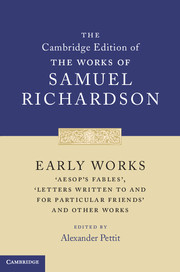Book contents
- Frontmatter
- Dedication
- Contents
- General Editors’ Preface
- Acknowledgements
- Chronology
- List of Abbreviations
- General Introduction
- Textual Introduction
- The Apprentice’s Vade Mecum (1733)
- A Seasonable Examination of the Pleas and Pretensions (1735)
- Preface to Aubin, A Collection of Entertaining Histories and Novels (1739)
- Aesop’s Fables (1739)
- Letters Written to and for Particular Friends (1741)
- Six Original Letters Upon Duelling (1765)
- Appendix: The Infidel Convicted (1731)
- Postscript
- Emendations
- Word-division
- Bibliographical Descriptions of Early Editions
- Explanatory Notes
- Index
General Introduction
Published online by Cambridge University Press: 30 June 2022
- Frontmatter
- Dedication
- Contents
- General Editors’ Preface
- Acknowledgements
- Chronology
- List of Abbreviations
- General Introduction
- Textual Introduction
- The Apprentice’s Vade Mecum (1733)
- A Seasonable Examination of the Pleas and Pretensions (1735)
- Preface to Aubin, A Collection of Entertaining Histories and Novels (1739)
- Aesop’s Fables (1739)
- Letters Written to and for Particular Friends (1741)
- Six Original Letters Upon Duelling (1765)
- Appendix: The Infidel Convicted (1731)
- Postscript
- Emendations
- Word-division
- Bibliographical Descriptions of Early Editions
- Explanatory Notes
- Index
Summary
Critical editions of productive authors from periods profuse in print – and Samuel Richardson and the eighteenth century qualify – include, by tradition, at least one volume of early or miscellaneous works, comprising a textual record of the author's first or least orderly steps along the road to canonisation. The examples are familiar to students of the period. The Wesleyan Edition of the Works of Henry Fielding constitutes a varied textual biography, stretching back some fourteen years before the publication of Fielding's first novel and indeed to within nine months or so of the aspiring poet and playwright's arrival in London at the age of twenty. Tobias Smollett wrote one play as a teenager and a few poems midway through his twenties, all precedent to the appearance of Roderick Random in 1748. These are represented in the pertinent volume of the University of Georgia Press's Works of Tobias Smollett, alongside Smollett's more mature but not better-known efforts in both genres and his periodical essays from the 1760s. Daniel Defoe was less quick to publish, but roughly thirty-one logorrhoeic years elapsed between the appearance of his first pamphlet and the earliest of the novels on which his fame rests. The most recent edition of his works includes a staggering fourteen volumes of material published prior to Robinson Crusoe (1719).
Richardson lends himself awkwardly to this formulation. Like only Laurence Sterne among the period's major novelists, he was not young when his first known publication appeared. His pre-novelistic output is small and compressed in time. After the success of Pamela (1740), he wrote novels almost exclusively, and only two at that, with all due respect to the legendary heft of Clarissa (1747–8) and Sir Charles Grandison (1753–4). Furthermore, ‘his’ earlier publications are not always his at all but represent a tangle of borrowings, some acknowledged, some not.
The busiest and most determined explicator of Richardson's variegated oeuvre is John A. Dussinger, who has proposed a hybrid textual genealogy that bedevils questions of attribution and even authorship. Dussinger's work converts the second ‘of ‘ in the current series title – The Cambridge Edition of the Works of Samuel Richardson – into an improbably complex word.
- Type
- Chapter
- Information
- Early Works'Aesop's Fables', 'Letters Written to and for Particular Friends' and Other Works, pp. xxxi - xcivPublisher: Cambridge University PressPrint publication year: 2011



